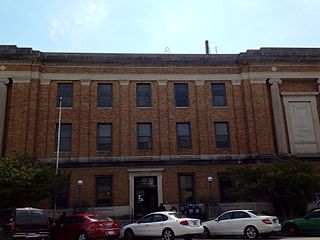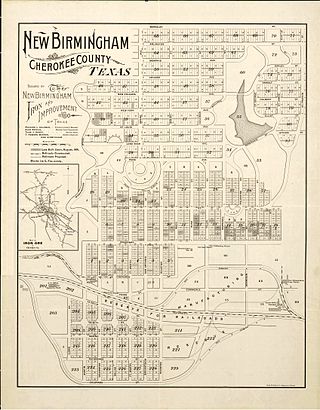
Birmingham is a city in the north central region of the U.S. state of Alabama. Birmingham is the seat of Jefferson County, Alabama's most populous county. As of the 2022 census estimates, Birmingham had a population of 196,910, down 2% from the 2020 census, making it Alabama's third-most populous city after Huntsville and Montgomery. The broader Birmingham metropolitan area had a 2020 population of 1,115,289, and is the largest metropolitan area in Alabama as well as the 50th-most populous in the United States. Birmingham serves as an important regional hub and is associated with the Deep South, Piedmont, and Appalachian regions of the nation.

Bessemer is a city in Jefferson County, Alabama, United States and a southwestern suburb of Birmingham. The population was 26,019 at the 2020 census. It is within the Birmingham-Hoover, AL Metropolitan Statistical Area, of which Jefferson County is the center. It developed rapidly as an industrial city in the late 19th and early 20th centuries.

Tarrant is a city in Jefferson County, Alabama, bordering Birmingham to the north. At the 2020 census, the population was 6,124. It is home to the ABC Coke plant owned by the Drummond Company, "the largest single producer of foundry coke in the U.S.".

The Vulcan statue is the largest cast iron statue in the world, and is the city symbol of Birmingham, Alabama, United States, reflecting its roots in the iron and steel industry. The 56-foot (17 m) tall statue depicts the Roman god Vulcan, god of the fire and forge, with ironworking equipment. It was created as Birmingham's entry for the Louisiana Purchase Exposition in St. Louis, Missouri. While it is the world's largest made of iron, it is also among the nation's tallest statues of any kind.

A steel mill or steelworks is an industrial plant for the manufacture of steel. It may be an integrated steel works carrying out all steps of steelmaking from smelting iron ore to rolled product, but may also be a plant where steel semi-finished casting products are made from molten pig iron or from scrap.

Sloss Furnaces is a National Historic Landmark in Birmingham, Alabama in the United States. It operated as a pig iron-producing blast furnace from 1882 to 1971. After closing, it became one of the first industrial sites in the U.S. to be preserved and restored for public use. In 1981, the furnaces were designated a National Historic Landmark by the United States Department of the Interior.
The Birmingham District is a geological area in the vicinity of Birmingham, Alabama, where the raw materials for making steel, limestone, iron ore, and coal are found together in abundance. The district includes Red Mountain, Jones Valley, and the Warrior and Cahaba coal fields in Central Alabama.

The Tannehill Ironworks is the central feature of Tannehill Ironworks Historical State Park near the unincorporated town of McCalla in Tuscaloosa County, Alabama. Listed on the National Register of Historic Places as Tannehill Furnace, it was a major supplier of iron for Confederate ordnance. Remains of the old furnaces are located 12 miles (19 km) south of Bessemer off Interstate 59/Interstate 20 near the southern end of the Appalachian Mountains. The 2,063-acre (835 ha) park includes: the John Wesley Hall Grist Mill; the May Plantation Cotton Gin House; and the Iron & Steel Museum of Alabama.
McWane, Inc. is one of the world's largest manufacturers of iron water works and plumbing products and one of America's largest privately owned companies. The company manufactures a host of different products including ductile iron pipe and fittings, cast iron soil pipe and fittings, heavy duty couplings, utility poles, network switches, monitoring equipment and related products. McWane is also a manufacturer of pressurized cylinders for the storage of propane and other gases through its Manchester Tank and Equipment Company division, as well as fire protection systems and extinguishers through its Amerex subsidiary.
Goldens' Foundry and Machine Co. is a privately held ductile iron and gray iron foundry with headquarters in Columbus, Georgia and additional facilities in Cordele, Georgia in the United States. It has operated continuously since 1882. Goldens' provides castings to a variety of industries, including agricultural, construction, power transmission, defense, and large vehicles.

The Iron & Steel Museum of Alabama, also known as the Tannehill Museum, is an industrial museum that demonstrates iron production in the nineteenth-century Alabama located at Tannehill Ironworks Historical State Park in McCalla, Tuscaloosa County, Alabama. Opened in 1981, it covers 13,000 square feet (1,200 m2).

The Tennessee Coal, Iron and Railroad Company (1852–1952), also known as TCI and the Tennessee Company, was a major American steel manufacturer with interests in coal and iron ore mining and railroad operations. Originally based entirely within Tennessee, it relocated most of its business to Alabama in the late nineteenth century, following protests over its use of free convict labor. With a sizable real estate portfolio, the company owned several Birmingham satellite towns, including Ensley, Fairfield, Docena, Edgewater and Bayview. It also established a coal mining camp it sold to U.S. Steel which developed it into the Westfield, Alabama planned community.
Cast iron pipe is pipe made predominantly from gray cast iron. It was historically used as a pressure pipe for transmission of water, gas and sewage, and as a water drainage pipe during the 17th, 18th, 19th and 20th centuries.

American Cast Iron Pipe Company is a manufacturer of ductile iron pipe, spiral-welded steel pipe, fire hydrants, and valves for the waterworks industry, and electric-resistance-welded steel pipe for the oil and natural gas industry. Headquartered in Birmingham, Alabama, American's diversified product line also includes static castings and high performance fire pumps.

New Birmingham is an abandoned town site in central Cherokee County, Texas, United States, now a ghost town. New Birmingham once seemed destined to be a major industrial mecca in the heart of east Texas. Lying just off U.S. Highway 69, the site was approximately two miles southeast of the county seat of Rusk.
John Joseph Eagan was an American industrialist and co-founder of the American Cast Iron Pipe Company (ACIPCO).
The following is a timeline of the history of the city of Birmingham, Alabama, USA.
James Ransom McWane was an American industrialist and founder of McWane, Inc., which was based in Birmingham, Alabama. It was one of the largest manufacturers of cast iron pipes in North America.

The Finley Roundhouse is a historic railway roundhouse located in the Acipco-Finley neighborhood of Birmingham, Alabama. It is one of the last two surviving railway roundhouses in the City of Birmingham and one of three surviving in the State of Alabama. It is also the largest reinforced concrete roundhouse in Alabama. It was built by the Southern Railway in 1915.

















